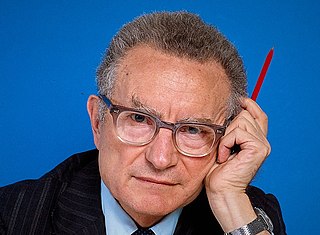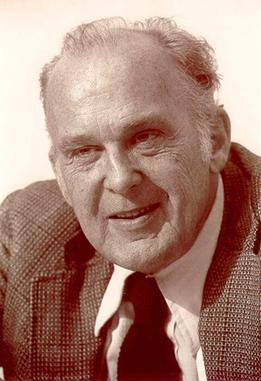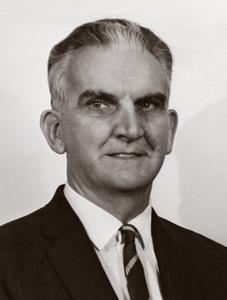
Economic history is the study of history using methodological tools from economics or with a special attention to economic phenomena. Research is conducted using a combination of historical methods, statistical methods and the application of economic theory to historical situations and institutions. The field can encompass a wide variety of topics, including equality, finance, technology, labour, and business. It emphasizes historicizing the economy itself, analyzing it as a dynamic entity and attempting to provide insights into the way it is structured and conceived.

Thorstein Bunde Veblen was an American economist and sociologist who, during his lifetime, emerged as a well-known critic of capitalism.
Evolutionary economics is a school of economic thought that is inspired by evolutionary biology. Although not defined by a strict set of principles and uniting various approaches, it treats economic development as a process rather than an equilibrium and emphasizes change, innovation, complex interdependencies, self-evolving systems, and limited rationality as the drivers of economic evolution. The support for the evolutionary approach to economics in recent decades seems to have initially emerged as a criticism of the mainstream neoclassical economics, but by the beginning of the 21st century it had become part of the economic mainstream itself.

Paul Anthony Samuelson was an American economist who was the first American to win the Nobel Memorial Prize in Economic Sciences. When awarding the prize in 1970, the Swedish Royal Academies stated that he "has done more than any other contemporary economist to raise the level of scientific analysis in economic theory". Economic historian Randall E. Parker has called him the "Father of Modern Economics", and The New York Times considers him to be the "foremost academic economist of the 20th century".

Law and economics, or economic analysis of law, is the application of microeconomic theory to the analysis of law. The field emerged in the United States during the early 1960s, primarily from the work of scholars from the Chicago school of economics such as Aaron Director, George Stigler, and Ronald Coase. The field uses economics concepts to explain the effects of laws, to assess which legal rules are economically efficient, and to predict which legal rules will be promulgated. There are two major branches of law and economics; one based on the application of the methods and theories of neoclassical economics to the positive and normative analysis of the law, and a second branch which focuses on an institutional analysis of law and legal institutions, with a broader focus on economic, political, and social outcomes, and overlapping with analyses of the institutions of politics and governance.
Institutional economics focuses on understanding the role of the evolutionary process and the role of institutions in shaping economic behavior. Its original focus lay in Thorstein Veblen's instinct-oriented dichotomy between technology on the one side and the "ceremonial" sphere of society on the other. Its name and core elements trace back to a 1919 American Economic Review article by Walton H. Hamilton. Institutional economics emphasizes a broader study of institutions and views markets as a result of the complex interaction of these various institutions. The earlier tradition continues today as a leading heterodox approach to economics.

The American Economic Association (AEA) is a learned society in the field of economics. It publishes several peer-reviewed journals. There are some 23,000 members.

Heterodox economics is any economic thought or theory that contrasts with orthodox schools of economic thought, or that may be beyond neoclassical economics. These include institutional, evolutionary, feminist, social, post-Keynesian, ecological, Austrian, complexity, Marxian, socialist, and anarchist economics.

Donald Thomas Campbell was an American social scientist. He is noted for his work in methodology. He coined the term evolutionary epistemology and developed a selectionist theory of human creativity. A Review of General Psychology survey, published in 2002, ranked Campbell as the 33rd most cited psychologist of the 20th century.

Geoffrey Martin Hodgson is Emeritus Professor in Management at the London campus of Loughborough University, and also the editor-in-chief of the Journal of Institutional Economics.

Kenneth Ewart Boulding was an English-born American economist, educator, peace activist, and interdisciplinary philosopher. Boulding was the author of two citation classics: The Image: Knowledge in Life and Society (1956) and Conflict and Defense: A General Theory (1962). He was co-founder of general systems theory and founder of numerous ongoing intellectual projects in economics and social science. He was married to sociologist Elise M. Boulding.

The European Association for Evolutionary Political Economy (EAEPE) is a pluralist forum of social scientists that brings together institutional and evolutionary economists broadly defined. EAEPE members are scholars working on realistic approaches to economic theory and economic policy. With a membership of about 500, EAEPE is now the foremost European association for heterodox economists and the second-largest association for economists in Europe.
The Journal of Political Economy is a monthly peer-reviewed academic journal published by the University of Chicago Press. Established by James Laurence Laughlin in 1892, it covers both theoretical and empirical economics. In the past, the journal published quarterly from its introduction through 1905, ten issues per volume from 1906 through 1921, and bimonthly from 1922 through 2019. The editor-in-chief is Magne Mogstad.
Karl William Kapp was a German-American economist and professor of economics at the City University of New York and later the University of Basel. Kapp's main contribution was the development of a theory of social costs that captures urgent socio-ecological problems and proposes preventative policies based on the precautionary principle. His theory is in the tradition of various heterodox economic paradigms, such as ecological economics, Marxian economics, social economics, and institutional economics. As such, Kapp's theory of social costs was an ongoing debate with neoclassical economics and the rise of neoliberalism. He was an opponent of the compartmentalization of knowledge and championed, instead, the integration and humanization of the social sciences.
The Journal of Economic Education (JEE) offers original peer-reviewed articles on teaching economics. The inaugural issue appeared in the fall of 1969. At the time, G.L. Bach wrote in the American Economic Review Papers and Proceedings (1971) that the JEE was to be the forum for scholarly work in economic education, primarily at the undergraduate level in colleges and universities, but including junior colleges and, to some extent, the high schools.
Katherine Jane Humphries, CBE FBA, is a Fellow of All Souls College, University of Oxford with the Title of Distinction of professor of economic history. Her research interest has been in economic growth and development and the industrial revolution. She is the former president of the Economic History Society and the current vice-president of the Economic History Association.

Larry Randall Wray is a professor of Economics at Bard College and Senior Scholar at the Levy Economics Institute. Previously, he was a professor at the University of Missouri–Kansas City in Kansas City, Missouri, USA, whose faculty he joined in August 1999, and a professor at the University of Denver, where he served from 1987 to 1999. He has served as a visiting professor at the University of Rome, Italy, the University of Paris, France, and the UNAM, in Mexico City. From 1994 to 1995 he was a Fulbright Scholar at the University of Bologna. From 2015 he is a Visiting professor at the University of Bergamo, located in Italy. He was a visiting professor at Masaryk University in the Czech Republic.

The International Association for Feminist Economics (IAFFE) is a non-profit international association dedicated to raising awareness and inquiry of feminist economics. It has approximately eight hundred members in sixty-four countries. The association publishes a quarterly journal entitled Feminist Economics.
The Association for Evolutionary Economics (AFEE) is an international organization of economists working in the institutionalist and evolutionary traditions of Thorstein Veblen, John R. Commons and Wesley Mitchell. It is part of the Allied Social Science Associations (ASSA), a group of approximately 63 organizations including the American Economics Association (AEA), that holds a three-day meeting each January.
The Veblen-Commons Award is presented annually by the Association for Evolutionary Economics in recognition of outstanding scholarly contributions to the field of evolutionary institutional economics. It is the Association’s highest honor, named after two key originators of the evolutionary-institutionalist tradition, Thorstein B. Veblen and John R. Commons.










